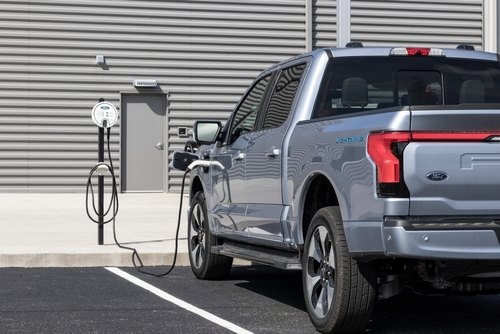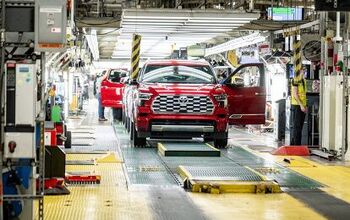Ford Celebrates EV Still Being Eligible for Tax Credits

On Wednesday, Ford Motor Co. celebrated the fact that its entire electric-vehicle lineup would still be eligible for consumer incentives under the so-called Inflation Reduction Act federal tax credit scheme. But it downplayed that some of those models won’t be eligible for the maximum amount due to stricter EV sourcing requirements pertaining to battery components and critical minerals.
“Customers made Ford the No. 2 electric vehicle brand in the U.S. last year, and as we scale our production to build more EVs for more customers, we believe this new incentive eligibility will help even more Americans join the EV revolution,” Marin Gjaja, chief customer officer for the company’s electric vehicle division, stated.
It might. But Ford is also expecting the EV side of the business (Model e) to lose $3 billion this year before it manages to swing an 8 percent pre-tax margin by the end of 2026. The brand’s EV sales certainly have been healthy, showing a 41 percent increase in sales through the first quarter of 2023. Though it’s worth mentioning that Blue Oval has only recently started ramping up production on what are mostly brand-new electric models.
Based on information provided by the manufacturer, only the Ford F-150 Lightning pickup truck and Lincoln Aviator Grand Touring will be eligible for the full $7,500 credit. Meanwhile, the Ford Mustang Mach-E, E-Transit, Escape Plug-In Hybrid, and Lincoln Corsair Grand Touring will cap out at $3,750.
This is down to new guidance issued by the U.S. Treasury Department late last week. For 2023, each vehicle needs to have at least 40 percent of the critical minerals contained within the battery to be extracted or processed in the United States — or a country with which the United States has a free trade agreement — in order to qualify for a $3,750 credit. Battery component requirements offer up another $3,750 and cite that 50 percent of the value of the battery components must be manufactured or assembled inside North America.
The above quotas increase annually, meaning that the credits are subject to change between model years. Customers can likewise get around the 2023 limitations by buying a vehicle before the new rules come into effect on April 18th — in which case the tax credit defaults to the old rules at $7,500.
Expect other manufacturers to begin listing which of their electric vehicles' qualify under the updated rules over the coming weeks.
[Image: Jonathan Weiss/Shutterstock]
Become a TTAC insider. Get the latest news, features, TTAC takes, and everything else that gets to the truth about cars first by subscribing to our newsletter.

A staunch consumer advocate tracking industry trends and regulation. Before joining TTAC, Matt spent a decade working for marketing and research firms based in NYC. Clients included several of the world’s largest automakers, global tire brands, and aftermarket part suppliers. Dissatisfied with the corporate world and resentful of having to wear suits everyday, he pivoted to writing about cars. Since then, that man has become an ardent supporter of the right-to-repair movement, been interviewed on the auto industry by national radio broadcasts, driven more rental cars than anyone ever should, participated in amateur rallying events, and received the requisite minimum training as sanctioned by the SCCA. Handy with a wrench, Matt grew up surrounded by Detroit auto workers and managed to get a pizza delivery job before he was legally eligible. He later found himself driving box trucks through Manhattan, guaranteeing future sympathy for actual truckers. He continues to conduct research pertaining to the automotive sector as an independent contractor and has since moved back to his native Michigan, closer to where the cars are born. A contrarian, Matt claims to prefer understeer — stating that front and all-wheel drive vehicles cater best to his driving style.
More by Matt Posky
Latest Car Reviews
Read moreLatest Product Reviews
Read moreRecent Comments
- ChristianWimmer It might be overpriced for most, but probably not for the affluent city-dwellers who these are targeted at - we have tons of them in Munich where I live so I “get it”. I just think these look so terribly cheap and weird from a design POV.
- NotMyCircusNotMyMonkeys so many people here fellating musks fat sack, or hodling the baggies for TSLA. which are you?
- Kwik_Shift_Pro4X Canadians are able to win?
- Doc423 More over-priced, unreliable garbage from Mini Cooper/BMW.
- Tsarcasm Chevron Techron and Lubri-Moly Jectron are the only ones that have a lot of Polyether Amine (PEA) in them.


































Comments
Join the conversation
If EV's are such awesome and price competitive products why is the tax credit necessary? OH, they aren't competitive, are they.
I look at these electric vehicles kind of like toys, or Minis. Sales will be strong initially for those that want one, but then tail off. Many (most of us) do not want an electric car. If anything, a Hybrid makes so much more sense but of course doesn't fit the Green Freaks agenda.